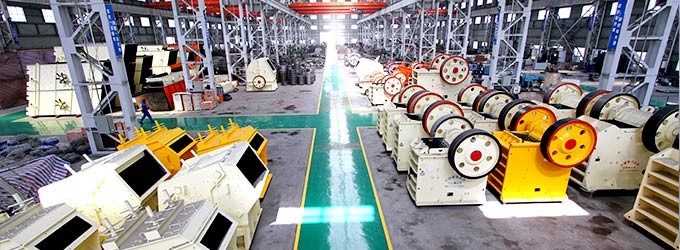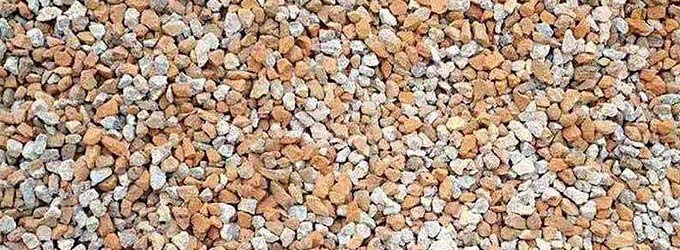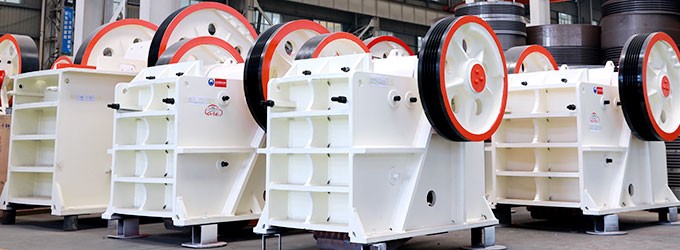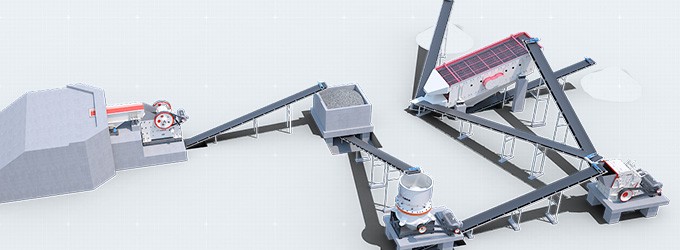Three things you must know about asphalt concrete
1. What is asphalt concrete?
Asphalt concrete is a composite material that consists of mineral aggregate bound together with asphalt. It is widely used in driveway pavement after being laid in layers and compacted.
Usually, there are four components of asphalt concrete: sand, stone chips, 5-10 mm stone, and 10-15 mm stone.
2. What is asphalt?
Asphalt is sticky, dark brown to black, highly viscous liquid produced from petroleum distillation residue. Asphalt is refined from the heavy component of crude oil and does not come from tar.
Although being used in dam proofing, coatings, paints, and waterproofing, asphalt is mainly applied for road pavement.
3. What is the difference between asphalt and asphalt concrete
Both of asphalt and asphalt concrete are applied for driveway pavements, but they still have some differences.
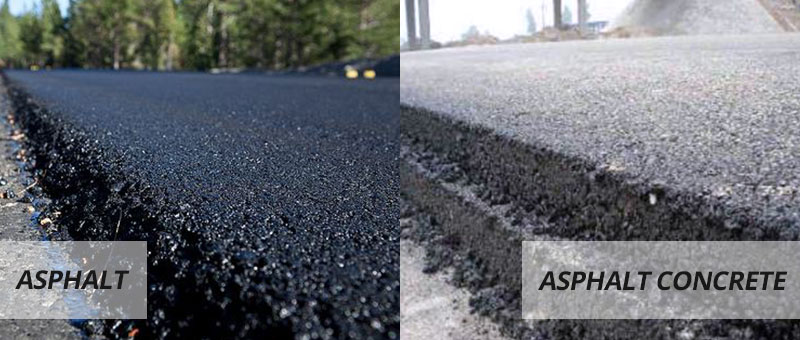
① Different processes
Asphalt concrete driveway requires sufficient strength and appropriate rigidity, and good stability. The drying shrinkage and temperature shrinkage deformation are small, and the surface should be smooth and compact. The camber should be consistent with the camber of surface layer and the elevation should meet requirements.
Asphalt driveway process includes construction preparation, raw material preparation, paving method, pavement compaction and construction method.
② Different requirements of ingredients
For the asphalt concrete, the ingredients gradation should ensure that after adding certain amount of asphalt, the mixture can form a dense, stable, and durable pavement. The gradation range can be calculated by formulas, or based on your experience.
For the asphalt, ingredients should consider water stability, fatigue resistance, high temperature stability and durability. To ensure the roughness and durability, we choose the asphalt with better anti-skid performance, and determine the asphalt proportion based on the climate, temperature, and topography of pavement construction area.
③ Durability
Asphalt concrete pavement is more durable than asphalt pavement, as it has a small porosity and is impervious to water.
4. Different types of asphalt concrete
① According to the different binders used: Asphalt concrete is divided into petroleum asphalt and coal asphalt.
② According to the different types of materials used: It is divided into aggregate, gravel, and mineral slag.
③ According to the maximum particle size of mixture: It is divided into the following particle sizes:
| Coarse granularity | Medium granularity | Fine granularity | Sand grains |
| 35-40 mm | 20-25 mm | 10-15 mm | 5-7 mm |
④ According to the density of mixture: It is divided into dense gradation, semi-open gradation and open gradation.
There is a very direct relationship between density and permeability. The higher the density, the lower the permeability. And the lower permeability keeps water and air out of pavement structure to prevent moisture damage, making the pavement more durable.
So, if you get one more percent of density, you can add 10 percent to its longevity in the field.
5. Physical properties of asphalt concrete
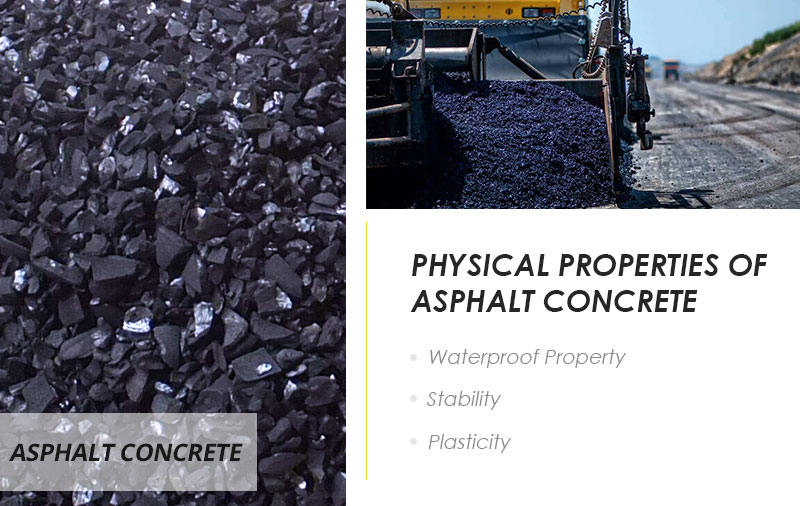
Stability
The stability of asphalt refers to the ability to resist deformation. The concrete road always cracks and breaks with the increase of temperature.
Differing from the concrete, the asphalt concrete can withstand the temperature at the range of 64°C to -16°C. That's why the asphalt concrete driveway is more durable.
Waterproof Property
The asphalt is a water-repellent material. It has a compact structure and can't dissolve in water. Besides, it has a good plasticity, adhesion ability and bond force with mineral materials so that it makes asphalt concrete be well waterproof.
Plasticity
The plasticity of asphalt concrete increases with composition, temperature, thickness, and stretching speed. The greater the elongation, the better the plasticity.
How to make asphalt concrete?
Excavation and transportation
Use heavy machinery to dig out large blocks of rocks, and then transport them by truck to a paving plant that is right on the quarry site.
Crushing process
Because the volume of rock is too large, it is necessary to use crushers to reduce it into small pieces of material.
The crushing process is mainly devided into three levels:
1. Coarse crushing:
Crush the huge block into less than 20 cm by a jaw crusher.
Then the crushed stone is sent to a screen via a conveyor belt. After screening, the rocks roll down on a series of incline screens with a maximum hole of 10 cm.

2. Medium crushing:
Pieces that are still large are sent to a secondary crusher, such as an impact stone crusher or cone crusher, to reduce the rock to 10 cm or less.
3. Fine crushing:
Then send rocks to a third or tertiary crusher that further reduces them to 2 centimeters or smaller.
Rock that is already small enough to pass through the screen, bypass the secondary crusher and go directly to the tertiary crusher.
After the last crushing stage, the largest stone size is about 2 cm. Materials smaller than 5mm, 5-10mm, 10-14mm are separated by a conveyor belt after screening.
All types of Crushing Machines For SaleDrying process
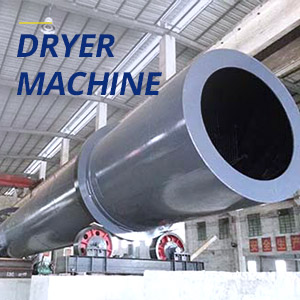
After crushing, the material of a specific size is sent to a dryer via a conveyor belt.
By using the dryer, the humidity of material can be reduced so that material can better bond with asphalt during the period. The screening equipment can screen the materials again to meet people's more precise needs.
Get Drum Dryer PriceMixing process
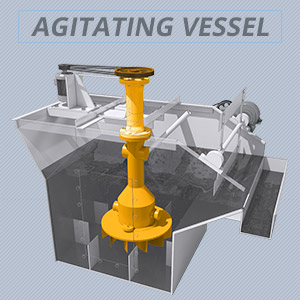
The dried material should be fullystirred in the mixer, which is designed for the surface layer, and then pump into the hot asphalt.
This fine mix is less permeable. It keeps water from penetrating down and avoids the formation of cracks.
How to install the asphalt concrete driveway?
Installing the asphalt concrete driveway correctly means that you can use a driveway that last 20 to 30 years rather than only a few years' life.
You have only one chance to do the job well.
Preparation of subgrade
Proper subgrade preparation is extremely important for a driveway that will last a lifetime. The better the subgrade preparation, the better the driveway.
Now, the most important aspect of grading process is drainage planning. The soil should be excavated in fine grade for proper water drainage.
Here you should make sure two things be done
- 1Make sure that the water runs off the asphalt
- 2Avoid water pooling and sitting on the surface of the asphalt to avoid pavement failures and premature deterioration
Material like rocks or gravel should be removed before grading and paving a driveway. Now if the driveway consists of any soft or unstable material like clay, sand or topsoil, they should also be removed.
A strong base material like road base, recycled concrete, or limestone, should be installed before installing the new hot asphalt. This will help to stabilize the subgrade and make the driveway much stronger and more durable.
Install the driveway with no crown
When it comes to a long driveway, contrary to popular belief, long driveways should not be graded with a crown in them. Long driveways should be graded flat with a slight pitch to each side to get the water to run off the surface of the asphalt.
There is absolutely no advantage of installing a driveway with a crown in it. Crowning can cause premature deterioration and pavement failures.
Spray herbicide
Once the grading is complete the subgrade should then be compacted with the rollers before installing the asphalt concrete. Next, an herbicide should be put down to minimize vegetation growth.
Weeds grow up through the asphalt can cause irreparable damage and eventually pavement failure so a quality herbicide should be put down prior to installing the asphalt.
Lay the asphalt concrete
Next step is to lay lay the asphalt concrete. Asphalt should be installed with an asphalt paving machine and not by hand. This is going to provide a consistent average depth of asphalt throughout the driveway and a much smoother finish to the surface.
Some areas that are too small for the equipment to get when need to be installed by hand, which can slightly add to the overall cost.
Experienced asphalt rakers are also an integral part of a nicely finished surface.
When asphalt concrete is being laid out of the paving machine, it's not compacted yet, therefore, it needs to be compacted. The asphalt should be compacted soon after it's laid out of the paving machine while it is still hot.
If the asphalt cools down too much before rolling it, it's not going to get compacted well enough.
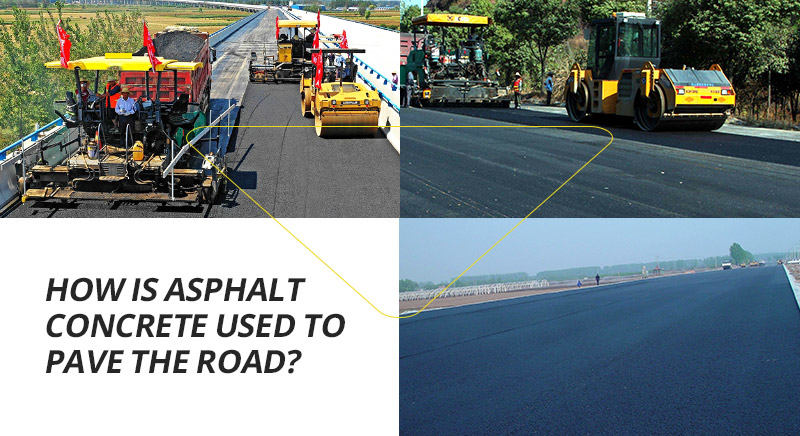
Attention:
- 1Too little compaction will allow water to penetrate the asphalt and cause it to deteriorate much faster, cutting the life expectancy dramatically.
- 2Too much compaction while it's still hot can cause the asphalt to stretch and crack causing premature pavement failures.
Compact the edges
Compacting the edges will help strengthen them and make them less prone to cracking and deterioration.
During the grading process, some of the subgrade material should left along the edges so that once the driveway is complete, that material can be pulled up to the edge of the asphalt.
This gives the driveway the appearance of sitting down in the soil rather than just being laid out on top or leaving edges exposed.
Doing so also helps to enhance the firmness of both sides, thereby minimizing cracks when the vehicle is off the driveway.
Once the asphalt installation is complete, caution tape or cones should be put up at the end of the driveway to keep people from driving on it until it's completely cool down.
Another paving choice
Some contractors may also offer to install a driveway into two layers. What this means is they'll install one layer of asphalt concrete compacted then start at the beginning of the driveway again and install the second layer of asphalt concrete and compact that layer.
But this is not a requirement and in most cases is really overkill for a residential driveway but it makes for a much more durable driveway with a much smoother ride and a beautiful finished surface.
While it does cost more money since there is more time labor and materials required, so be prepared to pay additional costs for the two-layer driveway.
FAQ about the asphalt concrete
How to calculate the density of asphalt/bitumen?
For example:
Weight of Pycnometer with Bitumen (W2) =23g
Weight of Empty and Dry Pycnometer(W1) =14g
Weight of Pycnometer with Distilled Water and Bitumen(W4) =50g
Weight of Pycnometer with Full of Water at Temperature 25°C(W3) =60g
Formula:
Density of Bitumen/Asphalt=(W2-W1)/(W3-W1) -(W4-W2)
Asphalt Density = (23-14)/ [(60-14) -(50-23)]
Asphalt Density=0.4737g/cm³
Which is cheaper concrete or asphalt driveway?
From international market prices of 2019-2020, asphalt is between 4$-8$ per square foot while concrete is from 8$ to 12$.
The asphalt concrete driveway may need maintenance every 3-5 years, but concrete would be degraded by salt very quickly is as little as one or two seasons whether the salt is applied on sidewalks or other flat surfaces, or if you building a retaining wall made out of concrete masonry unit.
How much area can be covered by 1ton asphalt?
One ton of asphalt can be covered 80 square feet area with 2 inches thickness material, which is best for frequently used driveway.
One ton of asphalt can be covered 160 square feet area with 1inch thickness material, which is for unfrequently used driveway.
One ton of asphalt can be covered 320 square feet area with 1/2 inches thickness material, which is for roof or floor painting.


